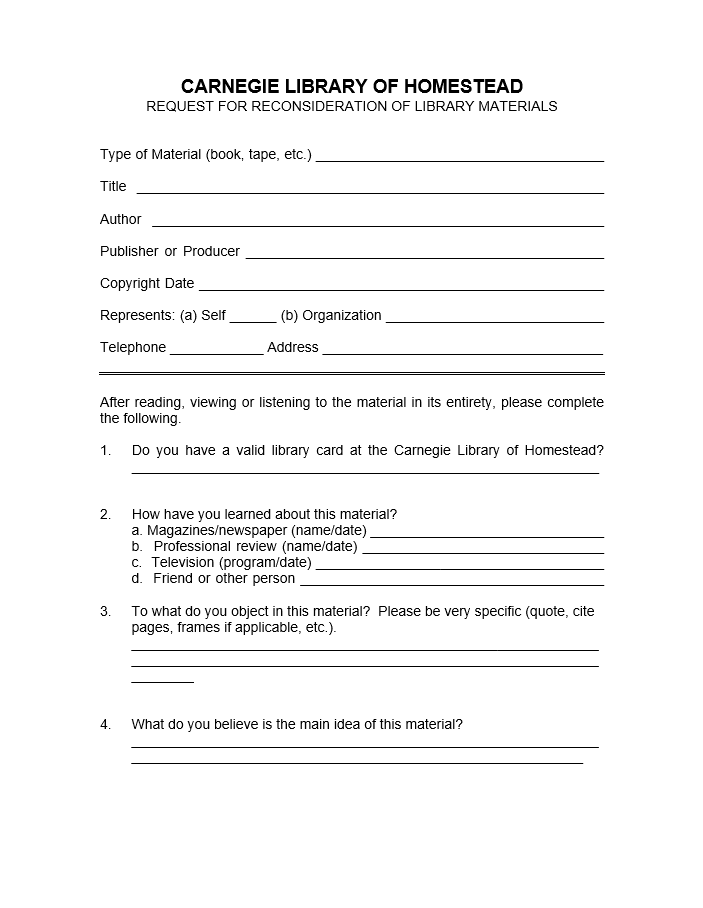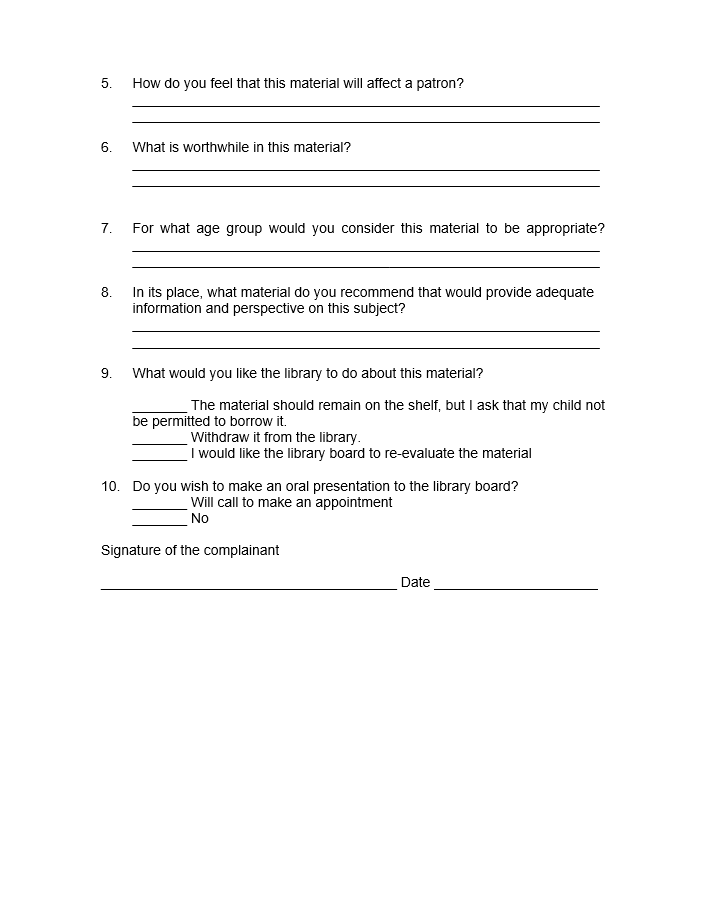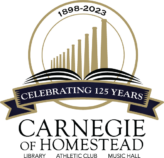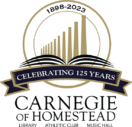Library Policies
Collection Development Policy
Statement of Purpose:
This policy describes the nature of Carnegie Library of Homestead’s collection and provides guidance to staff in developing and maintaining the collection and makes available the widest possible diversity of materials in a variety of formats. The continuous review of the library collection is necessary as a means of maintaining an active collection that meets the interests and needs of its users. This policy defines the standards, criteria and responsibilities of curating materials for the Carnegie Library of Homestead
Definitions:
Collection Development: Includes the planning, selection, acquiring, cataloging and weeding of the library’s collection of all formats.
Weeding or De-selection: Regular, on-going and systematic evaluation process whereby Library materials are withdrawn from the collection based on specific criteria such as outdated, worn, damaged, and/or duplicated material.
Reconsideration of Library Materials: Is the process in which a library patron files a complaint or a request concerning a specific item owned by the Library.
Overview of Collection Development:
The Carnegie Library of Homestead selects, organizes, and provides open access to information, resources and services that help community residents meet their personal, educational, cultural, professional and recreational needs. The Library strives to provide the best possible collection for users within its financial resources and space constraints. The decision to select an item is based on patron demand, anticipated need, timelines, reliability and the effort to maintain a wide and balanced collection. All materials are available for use by all users. The collection is reviewed and revised on an ongoing basis to meet current needs. The collection is current and popular, not archival and provides general coverage of subjects that reflect the needs of the Carnegie Library of Homestead Community. Selection of materials by the Library does not mean endorsement of the contents or views expressed in those materials. The existence of a particular point of view in the collection is an expression of the Library’s policy of intellectual freedom. The Carnegie Library of Homestead endorses the Library Bill of Rights, the Freedom to Read Statement and the Freedom to View statements of the American Library Association which are included in Appendix B.
Selection Criteria:
Carnegie Library of Homestead selects material for its collection in accordance with professionally accepted professional guidelines. Materials are selected in compliance with the mission and goals of the library. Space and budget constraints, as well as the ready accessibility of materials in other Allegheny County libraries and through interlibrary loan, are also considerations in selection. The library selects materials in a wide range of formats using the following criteria:
• Literary merit, artistic quality, aesthetic and recreational value
• Reviews in professional journals
• Clarity, accuracy and usefulness of information presented.
• Social, political and historical significance of the subject matter
• Community needs and popular demand.
• Relation to the existing collection and relation to other materials on the subject.
• Local interest (Homestead, Munhall and neighboring communities).
• Cost
Selection Tools:
Staff members read current library and review journals to select materials for purchase. In addition, sources such as major national newspapers, local publications and weekly magazines are used.
- Purchase selections: library users are encouraged to suggest titles and/or subjects. The above stated selection criteria will be used in order to review these selections.
- Self-published materials: We desire to support local authors while maintaining the standards used for the permanent collections and have set specific guidelines for self published materials. Authors wishing to contributes to the library must meet the criteria listed below:
- Authors must be residents, or the book must take place in the Homestead area.
- Each book must be approved by a librarian before being accepted for placement.
- Books will be accepted as donations from the author or publisher.
- Books will not be purchased at patron request unless they have been reviewed in standard sources. Patrons may donate copies of authors’ self-published books. These will be evaluated in accord with the library’s collection development policy and are not guaranteed inclusion into the collection.
Gifts/Donations:
Items donated to the library or given as a memorial or in honor of an individual must meet the same standards as other items selected for inclusion in the collection. If a donated item is in good condition and not added to the library’s collection, it will be placed in the Library’s ongoing book sale. No other conditions may be imposed relating to any gift, donation, or memorial either before or after its acceptance by the Library.
Weeding/De-selection:
An active and continuous weeding program is essential in maintain a viable and useful collection. The purpose of this process is to make sure that the collection itself is viable and useful. Carnegie Library of Homestead is not an academic library and its collection and weeding policy reflect viability, interest and demand.
• Worn or mutilated items.
• Duplicate copies or seldom used titles.
• Materials which contain outdated or inaccurate information.
• Superseded editions of specific titles.
• Materials no longer of interest or demand.
The library does not automatically replace all materials due to loss or damage. Decisions on replacement are made with the following criteria:
• Demand for item
• Number of existing copies
• Coverage within the collection
• Timeliness of the information
• Availability for the title for reorder
• Cost of mending versus replacement
Reconsideration of Materials:
While anyone is free to reject Library materials of which they do not approve, the freedom of others to access these materials cannot be restricted. The Library does not stand in loco parentis. Parents and guardians have the responsibility to guide the reading, listening and viewing choices of their own minor children. Selection of adult collection materials cannot be inhibited by the possibility that items may be accessed by minors. Individuals may express their objects to particular Library materials by completing a Request for Reconsideration form which they can request at the front desk. The written complaint is then reviewed by the Library Director and the Library Board of Trustees. The decision of the board is final. A written reply conveying the decision of the Board shall be sent to the complainant. Decisions are based on careful review of the objection, the item in question and the American Library Association’s Guidelines on Intellectual Freedom.
Appendix A
Requests for Reconsideration Form
Date:
Type of Work/Resource: Circle all that apply.
- Book
- Audiobook
- DVD
- CD
- Magazine/Newspaper
- Other
Title of Work: Please tell us the title or describe the work/resource.
Author/Performer: Please reference the author/performer in question.
What brought the work/resource to your attention? Please describe.
Please comment on the work/resource as a whole. What are your specific concerns about the work.
What action would you like the Library to take? Please describe and let us know why.
Are there resource(s) you would recommend to provide additional information and/or other viewpoints on this topic? Please describe.
Your Name and/or Organization:
Address:
Phone Number:
Who do you represent?
Self
Organization
Appendix B
Library Bill of Rights
The American Library Association affirms that all libraries are forums for information and ideas, and that the following basic policies should guide their services.
1. Books and other library resources should be provided for the interest, information, and enlightenment of all people of the community the library serves. Materials should not be excluded because of the origin, background, or view contributing to their creation.
2. Libraries should provide materials and information presenting all points of view on current and historical issues. Materials should not be proscribed or removed because of partisan or doctrinal disapproval.
3. Libraries could challenge censorship in the fulfillment of their responsibility to provide information and enlightenment.
4. Libraries could cooperate with all persons and groups concerned with resisting abridgement of free expression and free access to ideas.
5. A person’s right to use a library should not be denied or abridged because of origin, age, background, or views.
6. Libraries which make exhibit and meeting rooms available to the public they serve should make such facilities available on an equitable basis, regardless of the beliefs or affiliations of individuals or groups requesting their use.
Adopted June 18, 1948
Amended February 2, 1961 and January 23, 1980
By the ALA Council
The Freedom to Read
A joint statement by the American Library Association and the Association of American Publishers originally issued in May of 1953, and revised January 1972.
1. It is in the public interest for publishers and librarians to make available the widest diversity of views and expressions, including those which are unorthodox or unpopular with the majority.
2. Publishers, librarians and booksellers do not need to endorse every idea or presentation contained in the books they make available. It would conflict with the public interest for them to establish their own political, moral or aesthetic views as standard for determining what books should be published or circulated.
3. It is contrary to the public interest for publishers or librarians to determine the acceptability of a book on the basis of the personal history to political affiliations of the author.
4. There is no place in our society for efforts to coerce the taste of others, to confine adults to the reading matter deemed suitable for adolescents or to inhibit the efforts of writers to achieve artistic expression.
5. It is not in the public interest to force a reader to accept any book the prejudgment of a label characterizing the book or author as subversive or dangerous.
6. It is the responsibility of publishers and librarians, as guardians of the people’s freedom to read, to contest encroachments upon that freedom by individuals or groups seeking to impose their own standards or tastes upon the community at large.
7. It is the responsibility of publishers and librarians to give full meaning to the freedom to read by providing books that enrich the quality and diversity of thought and expression.
By the exercise of this affirmation responsibility, bookmen can demonstrate that the answer to a bad book is a good one, the answer to a bad idea is a good one.
NOTE: “Books” as used in this statement include all kinds of materials acquired for library use.
Freedom to View
The FREEDOM TO VIEW, along with the freedom to speak, to hear, and to read, is protected by the First Amendment to the Constitution of the United States. In a free society, there is no place for censorship of any medium of expression. Therefore, these principles are affirmed:
To provide the broadest access to film, video, and other audiovisual materials because they are a means for the communication of ideas. Liberty of circulation is essential to insure the constitutional guarantee of freedom of expression.
To protect the confidentiality of all individuals and institutions using film, video, and other audiovisual materials.
To provide film, video, and other audiovisual materials which represent a diversity of views and expression. Selection of a work does not constitute or imply agreement with or approval of the content.
To provide a diversity of viewpoints without the constraint of labeling or prejudging film, video, or other audiovisual materials on the basis of the moral, religious, or political beliefs of the producer or filmmaker or on the basis of controversial content.
To contest vigorously, by all lawful means, every encroachment upon the public’s freedom to view.
This statement was originally drafted by the Freedom to View Committee of the American Film and Video Association (formerly the Educational Film Library Association) and was adopted by the AFVA Board of Directors in February 1979. This statement was updated and approved by the AFVA Board of Directors in 1989.
Endorsed January 10, 1990, by the ALA Council
Appendix C
Suggest a Purchase
Title:
Author/Performer:
Publisher (if known):
ISBN (if known):
Format Type (Select one):
- Book
- Large Print
- Book on CD
- DVD
- Blu-Ray
Primary Audience:
- Children
- Teen
- Adult
Name:
Phone Number:
Email Address:
Date Submitted:
Updated 7.13.2023
Library Cards
All Allegheny County residents can sign up for a library card at the library circulation desk. Library cards are free, and give you access to wide variety of library materials not just in the Carnegie Library of Homestead, but in all of Allegheny County!
To apply for a library card you must show photo ID. Minors under the age of 18 must be present with a parent or guardian to apply for a library card. The parent or guardian must have photo ID, and must sign and accept financial responsibility for the minor.
Please report lost or stolen library cards immediately. Bring ID to the library and Circulation Desk staff will issue you a new one. There is a $1.00 charge for a new card.
You are not permitted to use another patron’s card for internet or borrowing privileges. Your card may be blocked if you are using another patron’s card.
Your library card gives you access to:
- 3,000,000 county-wide items in collection including books, audiobooks, DVDs, CDs, newspapers, magazines (current and back issue)
- Access to online databases and applications for eBooks, music, and genealogy
- Free computer use
- Free internet access and WiFi
- Interlibrary Loan
- Reference assistance in person, by phone (412-462-3444 x231) or by email
- Photocopier (black and white $0.20 per copy plus tax, color $0.65 per copy plus tax)
- Prints ($0.20 per page plus tax)
- Fax machine, ingoing and outgoing ($1.50 per page)
- Microfilm reader and printer
- Historical files
- Homestead Messenger from 1880 on microfilm
- Programs for all ages, including weekly programs in the Children’s Room and free computer classes for adults and senior citizens. For information on specific events, please view our calendar.

Loan Periods and Fines

Loan Periods
- 3 weeks for books, books and music on CD, DVDs, and audio books
- Automatic renewal on items that are not on hold for someone else
- Reference materials are for in-library use only
- As of 2020, Carnegie Library of Homestead is fine-free
- Borrower is responsible for the replacement cost of lost or damaged items



